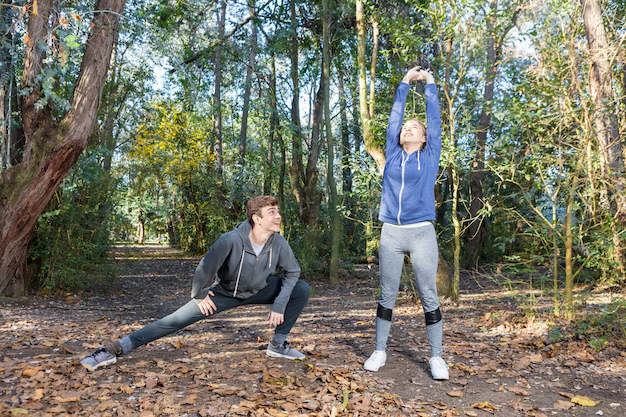Benefits of Exercising Outdoors In today’s fitness culture, many of us hit the gym or exercise indoors by default. But outdoor exercise has unique benefits that can enhance physical and mental well-being in ways that an indoor workout often can’t match. This article explores the many advantages of exercising outdoors, including benefits for physical health, mental wellness, and overall motivation.
Physical Health Benefits of Exercising Outdoors
- Improved Cardiovascular Health:
- Exercising outside, especially in natural settings with fresh air, can enhance cardiovascular endurance and lung capacity. Moving through varied terrains, such as hills or uneven ground, also challenges the body in ways that a treadmill might not.
- Studies suggest that people are often able to work out at higher intensities outdoors without feeling as fatigued, which benefits heart health and stamina.
- More Vitamin D:
- Vitamin D, known as the “sunshine vitamin,” is produced by the body in response to sunlight. Getting even 10–15 minutes of sunlight during outdoor exercise helps you meet your daily vitamin D needs.
- Vitamin D supports bone health, immune function, and mood regulation, making it an essential nutrient for overall well-being.
- Engagement of More Muscle Groups:
- Outdoor exercise often involves more dynamic movement patterns than indoor workouts. For instance, jogging on trails requires greater balance and coordination, which activates stabilizing muscles that might not be used on a flat surface.
Mental Health and Emotional Benefits
- Reduced Stress and Anxiety:
- Being in nature has a calming effect on the mind, helping reduce levels of cortisol, the body’s primary stress hormone. Outdoor exercise combines the stress-reducing benefits of nature with the endorphin boost from physical activity.
- Studies show that even brief periods spent in nature can lower anxiety and improve mood, making outdoor exercise an effective stress-management tool.
- Enhanced Mood and Mental Clarity:
- Exercise, especially in a natural setting, releases endorphins and other feel-good chemicals that elevate mood. Being outdoors also stimulates dopamine production, which helps with motivation and a sense of reward.
- Natural surroundings and fresh air can improve mental clarity, creativity, and focus, making outdoor workouts a great way to boost productivity and mood.
- Lower Risk of Depression:
- Exposure to sunlight and time spent in green spaces have been linked to reduced risk of depression. Outdoor exercise has even been used as a complementary treatment for individuals with depression, as it helps alleviate symptoms and improves overall mood.

Benefits for Immune Function
- Exposure to Fresh Air:
- Indoor air often has higher levels of pollutants and allergens, which can lead to respiratory issues over time. Fresh air improves lung function, increases oxygen intake, and helps reduce inflammation.
- Spending time outdoors, particularly in natural environments, has also been shown to boost immune function, helping the body fight off infections.
- Soil Microbes and “Forest Bathing”:
- When you exercise outdoors, especially in forested areas, you’re exposed to beneficial microbes that may strengthen immune health. This concept, known as “forest bathing” (or shinrin-yoku), is practiced in Japan for its many health benefits, including immune support and stress reduction.
Outdoor Exercise is More Engaging and Fun
- Variety and Spontaneity:
- Outdoor environments offer a variety of terrains, from trails and hills to parks and beaches, adding a level of spontaneity to your workouts that indoor routines may lack. Different surfaces and terrains keep the body guessing, which prevents adaptation and can improve fitness levels.
- Less Monotony, More Enjoyment:
- Indoor workouts can sometimes feel repetitive, leading to decreased motivation. However, exercising in natural surroundings with changing scenery and fresh air keeps workouts exciting and engaging.
- Group Activities and Social Opportunities:
- Outdoor exercise can provide an opportunity to join community fitness groups, such as running clubs or outdoor yoga classes, which offer a sense of camaraderie and motivation. Exercising with others not only makes it more enjoyable but also boosts adherence to fitness goals.
Increased Motivation and Adherence to Fitness Goals
- Boost in Motivation:
- Research shows that people tend to feel more motivated to exercise outdoors than indoors, possibly due to the combined mental and physical benefits of fresh air, sunlight, and a change of scenery.
- Outdoor exercise reduces feelings of effort, meaning you can often exercise at a higher intensity or for a longer duration without feeling as fatigued.
- Consistency in Exercise Routine:
- People who exercise outdoors often find it easier to stick to a routine because the activity feels less like a chore and more like a break from the daily grind.
- Even short outdoor workouts can boost consistency, helping individuals meet recommended physical activity levels and maintain their fitness goals over time.
Environmental Benefits and Sustainability
- Eco-Friendly Exercise Options:
- Outdoor activities like hiking, biking, and running are low-impact on the environment compared to driving to the gym or using electricity-powered fitness machines.
- By exercising outside, you can reduce your carbon footprint and support eco-friendly fitness habits.
- Connection to Nature:
- Spending time in nature through outdoor exercise fosters an appreciation for the environment. This connection to nature can inspire eco-conscious lifestyle changes, including waste reduction, conservation, and sustainable choices.
Practical Tips for Safe and Effective Outdoor Workouts
- Safety Precautions:
- Stay hydrated, wear sunscreen, and dress appropriately for the weather to protect your skin and avoid sunburn or dehydration.
- When exercising in unfamiliar areas, plan your route in advance, bring a phone, and let someone know where you’ll be.
- Incorporating Variety:
- To get the most out of outdoor exercise, mix up your activities. Alternate between walking, jogging, cycling, or outdoor yoga to keep your workouts balanced and fun.
- Listening to Your Body:
- The varied terrain outdoors can sometimes lead to injuries if you’re not careful. Take breaks, be mindful of uneven surfaces, and listen to your body to avoid strain or injury.

Conclusion
Exercising outdoors provides a wealth of benefits, from improved physical fitness and mental well-being to enhanced immune function and environmental consciousness. Whether it’s a brisk walk in the park, a trail run, or a yoga session on the beach, outdoor exercise brings a unique joy and motivation to physical activity. So next time you’re thinking about hitting the gym, consider heading outside instead—you’ll be surprised at how much it can enhance your health, mood, and motivation.

